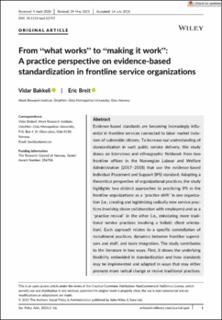| dc.contributor.author | Bakkeli, Vidar | |
| dc.contributor.author | Breit, Eric Martin Alexander | |
| dc.date.accessioned | 2021-09-27T15:02:57Z | |
| dc.date.available | 2021-09-27T15:02:57Z | |
| dc.date.created | 2021-07-29T12:52:23Z | |
| dc.date.issued | 2021-07-26 | |
| dc.identifier.issn | 0144-5596 | |
| dc.identifier.issn | 1467-9515 | |
| dc.identifier.uri | https://hdl.handle.net/11250/2783812 | |
| dc.description.abstract | Evidence-based standards are becoming increasingly influential in frontline services connected to labor market inclusion of vulnerable citizens. To increase our understanding of standardization in such public service delivery, this study draws on interviews and ethnographic fieldwork from two frontline offices in the Norwegian Labour and Welfare Administration (2017–2018) that use the evidence-based Individual Placement and Support (IPS) standard. Adopting a theoretical perspective of organizational practices, the study highlights two distinct approaches to practicing IPS in the frontline organizations: as a “practice shift” in one organization (i.e., creating and legitimizing radically new service practices involving closer collaboration with employers) and as a “practice revival” in the other (i.e., reinstating more traditional service practices involving a holistic client orientation). Each approach relates to a specific constellation of recruitment practices, dynamics between frontline supervisors and staff, and team integration. The study contributes to the literature in two ways. First, it shows the underlying flexibility embedded in standardization and how standards may be implemented and adapted in ways that may either promote more radical change or revive traditional practices. Second, it nuances positions in the literature on the impact of standards on professional service work. On this basis, the study suggests broadening the attention in research on evidence-based standards in public service delivery from discussions of “what works” to understanding the broader organizational dynamics involved in “making it work.” | en_US |
| dc.description.sponsorship | This article is based on research funded by Norway Research Council, as part of the project “Front line innovations in the welfare services” (INNOWEL). | en_US |
| dc.language.iso | eng | en_US |
| dc.publisher | Wiley | en_US |
| dc.relation.ispartofseries | Social Policy & Administration; | |
| dc.rights | Attribution-NonCommercial-NoDerivatives 4.0 Internasjonal | * |
| dc.rights.uri | http://creativecommons.org/licenses/by-nc-nd/4.0/deed.no | * |
| dc.subject | Activation work | en_US |
| dc.subject | Evidence-based practices | en_US |
| dc.subject | Individual placements | en_US |
| dc.subject | Individual support | en_US |
| dc.subject | Professionalism | en_US |
| dc.subject | Standardization | en_US |
| dc.title | From “what works” to “making it work”: A practice perspective on evidence-based standardization in frontline service organizations | en_US |
| dc.type | Peer reviewed | en_US |
| dc.type | Journal article | en_US |
| dc.description.version | publishedVersion | en_US |
| dc.rights.holder | © 2021 The Authors | en_US |
| cristin.ispublished | true | |
| cristin.fulltext | original | |
| cristin.qualitycode | 1 | |
| dc.identifier.doi | https://doi.org/10.1111/spol.12757 | |
| dc.identifier.cristin | 1923012 | |
| dc.source.journal | Social Policy & Administration | en_US |
| dc.source.pagenumber | 1-16 | en_US |
| dc.relation.project | Norges forskningsråd: 269298 | en_US |
| dc.relation.project | Norges forskningsråd: 256706 | en_US |

